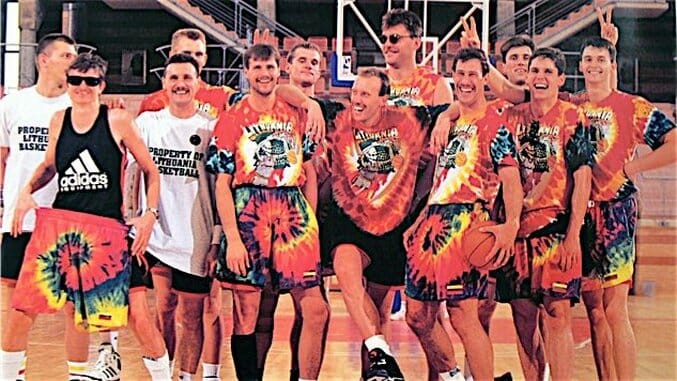5 Inspiring Documentaries About Basketball

The big prize—a high school trophy, a college scholarship, a pro contract—is built into the sports narrative, lending inherent drama to any documentary on the subject. But with basketball, so often played by kids with just a hoop, a ball, a patch of asphalt and dreams of the rarified world of the NBA, the prize seems uniquely attainable yet elusive, and the stories that come from this sport have an urgency all their own. Here are five documentaries that look at the tangled intersection of athleticism, dreams and the sometimes hard lessons found off and on the hard court.
1. Hoop Dreams (1994)

If there can be such a thing as a flagship basketball documentary, this is it. What began as a half-hour project for PBS evolved into a 171-minute opus, the culmination of five years spent following the lives of two African American kids from crime-ridden Chicago neighborhoods who are recruited to play for St. Joseph High School, a mostly white prep school and basketball powerhouse (and the alma mater of Isiah Thomas). Directed, produced and written by Steve James, Hoop Dreams is an exploration of race, class and American values. It won the Audience Award for Best Documentary at the 1994 Sundance Film Festival, and Roger Ebert later called it the best film of the decade. —Allison Gorman
2. The Heart of the Game (2005)

Often compared to Hoop Dreams, The Heart of the Game also centers on a talented kid from a tough neighborhood playing at an upper-class high school. This time the setting is Seattle, and the kid is a girl, Darnellia Russell, whose challenges off the court threaten not only her own ambitions to play in college, but also her coach’s ambitions to win state. Ultimately The Heart of the Game carries the standard sports message about tenacity in the face of adversity, and while the true story of Russell and the Roosevelt High Roughriders has the kind of stand-up-and-cheer ending that might have seemed Rudy-esque in a dramatization, Ward Serrill’s documentary won over all but the harshest critics. —Allison Gorman
3. The Other Dream Team (2012)

The Other Dream Team focuses on the role basketball has played in the Lithuanian community by helping them through bleak economic and social times, focusing specifically on the members of the first ever Olympic Lithuanian basketball team in 1992 after the collapse of communism. It’s not just a film for sport enthusiasts or history buffs. Marius Markevicius vividly paints an inspiring picture of a group of men overcoming great political hurdles in order to bring pride back to a country that had been broken for decades and blaze a path for future generations. The Other Dream Team is a powerful, inspirational documentary about the rebirth of a nation’s spirit via sport. —Emily Kirkpatrick
4. No Look Pass (2013)

No Look Pass follows basketball point guard Emily Tay, a then-Harvard senior struggling with her sexuality, opponents’ racism, and her parents’ cultural reluctance to let her be herself. She shares her life easily to the camera, even as she keeps her defenses up around her teammates and girlfriend. But there’s life after college, and Tay works hard to continue her dream to play professionally while traveling the world. A documentary lives or dies by its subject, and Tay’s determination to pursue her basketball career, to love freely, and to travel and experience other cultures is the compelling centerpiece of No Look Pass. It’s a hopeful moment of transition in a young athlete’s career, delicately captured for the world to see. —Monica Castillo
5. The Iran Job (2013)

Filmed in 2008 and 2009, a decade after the United States and Iran cut diplomatic ties and just before the reformist uprising against Iran’s bellicose former president, Mahmoud Ahmadinejad, The Iran Job was made with the help of supporters like Gloria Steinem and journalist Christiane Amanpour, as well as a $100,000 Kickstarter campaign. It covers a season on the court with Kevin Sheppard, a point guard from Jacksonville University who played in several locations abroad before joining a team in Iran. Sheppard quickly came to love the Iranian people, becoming an unofficial but powerful ambassador to a country that ostensibly despised his. —Allison Gorman







































